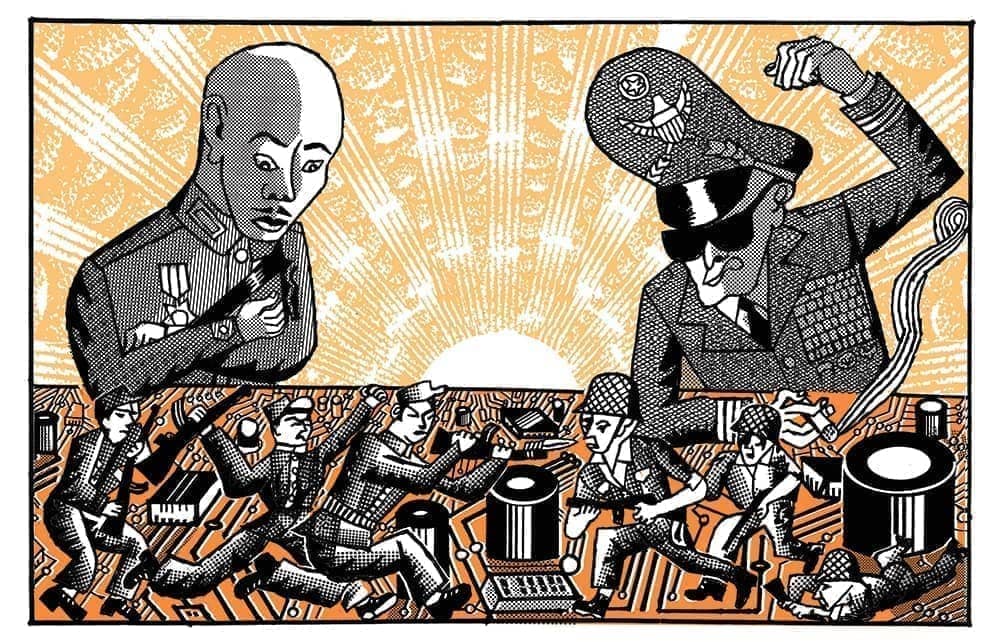The chip war between China and America is heating up, with an increasingly assertive Joe Biden battling with Xi Jinping as he enters his third term as Chinese leader. The US last week further restricted China’s access to advanced American know-how, in what were some of the most stringent export controls for decades. Xi didn’t mention semiconductors in a speech on Sunday marking the opening of the Communist party’s twice-a-decade congress in Beijing, but he did pledge that China would ‘resolutely win the battle in key core technologies’. To compete with the US, China will need better tech. These new export controls will make Xi’s vision much harder to achieve.
Joe Biden has tightened restrictions on exports to China of high-performance chips critical for the development of supercomputers, surveillance systems and advanced weapon systems. It has also blocked the Chinese from buying foreign-made chips that use American tools and software. The US dominates the production of such tools, and now any firm using them will require a licence for exporting to China. It is one of the US’s most aggressive moves against China yet.
It is one of the US’s most aggressive moves against China yet
Chips are fundamental to advanced economies: crucial to the production of products ranging from smartphones to laptops, cars, aircraft and even cookers and refrigerators. The most advanced chips are needed for the development of artificial intelligence, with numerous military implications. As relations between the US and China have deteriorated, they have become a key battleground as the two vie for technological leadership.
The US is trying to block China’s access to anything that could boost its military power. China is a massive consumer of American chips, and is also pouring $100 billion into its domestic industry in a race to achieve self-sufficiency. It has claimed significant advances, though these are difficult to verify. However, it is generally accepted that China’s chip-making abilities are years behind those of America or Taiwan. Estimates vary, but at the high end the ‘chip-gap’ is reckoned to be more than a decade. Even then, China is chasing a fast-moving target. Beijing’s cyber-spies have been scrutinising America’s capabilities.
The US has targeted a jewel in the Chinese crown: a rapidly growing Wuhan company called Yangtze Memory Technologies Corp (YMTC), which is China’s largest producer of memory chips. It is seen by Xi as a national champion in his efforts to develop a domestic chip industry. US officials allege that the company works closely with the Chinese military and has violated earlier trade sanctions by supplying chips to Huawei, the Chinese telecoms company: another adversary the US has tried to handicap.
YMTC was reportedly stockpiling foreign equipment for months in anticipation of US restrictions. Washington has put the company on its ‘unverified list’, meaning it has not been able to check whether American technology is being diverted for military use. The list is seen as a stepping stone to yet more severe sanctions against the Chinese chipmaker. US chip equipment suppliers are also pulling their US staff out of Chinese facilities, including those of YMTC.
YMTC’s rise may be somewhat halted. The company has reportedly been courting high-profile clients, including Apple. The iPhone-maker recently confirmed it was considering using YMTC chips in some smartphones, triggering outrage from US lawmakers. This will almost certainly be derailed by the latest export controls.
There have been signs that China’s chip splurge is not going according to plan for a while. In the run-up to the CCP congress, an anti-corruption campaign targeted top officials in the industry, including the country’s information technology minister, amid fears that funds are being squandered or stolen. Taken with the American restrictions, this represents a severe setback to Xi’s pledge to dominate the key technologies of the future. No wonder, then, that he has described corruption as ‘the biggest cancer’.
Xi told the CCP on Sunday that China would eventually achieve ‘technology self-reliance’. It has no option. If Beijing is cut off from American chips, China’s ability to develop a whole swathe of advanced technologies will set it back several steps in the new cold war.







Comments